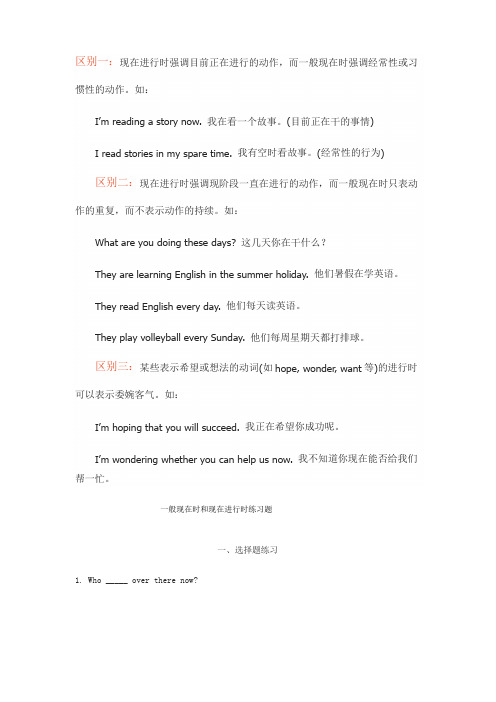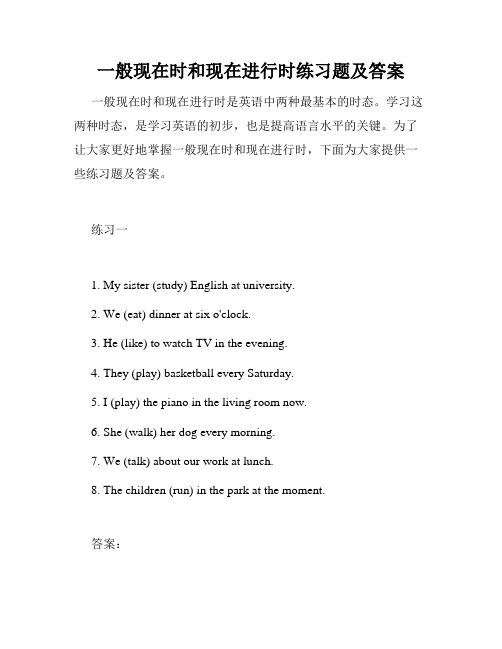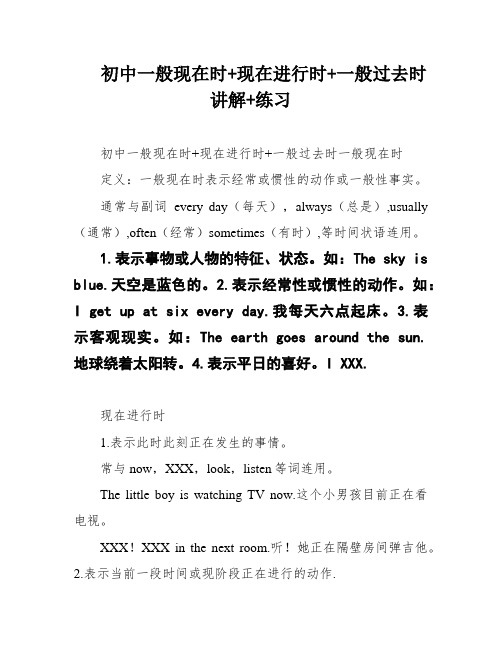初中语法一般现在时和现在进行时讲解、练习含答案
(完整版)初中语法一般现在时和现在进行时讲解、练习含答案

一般现在时:一、定义与讲解:一般现在时表示经常或习惯性的动作或一般性事实。
,也可表示现在的状态或主语具备的性格和能力。
通常与副词every day(每天),always(总是),usually(通常),often (经常)sometimes(有时),等时间状语连用。
例:(1)表示事物或人物的特征、状态。
The sky is blue.天空是蓝色的。
Mary’s father is an English teacher. 玛丽的爸爸是一名英语老师。
(2)表示经常性或习惯性的动作。
I get up at six every day.我每天六点起床。
She plays sports every day. 她每天都做运动。
(3)表示客观现实。
The table has four legs.桌子有四条腿。
There are 50 students in my class. 我们班有50个学生。
(4)表示客观真理,科学原理,自然现象,等客观事实或格言谚语等。
The sun rises in the east every day.太阳每天从东方升起。
The earth goes around the sun.地球绕着太阳转。
(5)表示平日的喜好。
I like bananas. We don’t like vegetables.He likes ice cream. She doesn’t like strawberries.二.只有主语在第三人称单数时用动词的“三单形式”,其他人称用动词原形。
★动词三单形式的变化规则:1.(1)多数直接在动词词尾加-s.play — plays like — likesask---asks work---works get---gets call---calls(2)以字母s, x, ch, sh或o结尾的动词,在词尾直接加-es.watch---watches wish---wishes do---does go---goes (3)以“辅音字母加 - y”结尾的动词,要先变y为i再加-es.try---tries study---studies cry---cries fly---flies2.不规则变化:be---- is have----has三、一般现在时的句子转换:(1)变一般疑问句:当句子中有be动词或情态动词时,则把be动词或情态动词(can,could等)提到主语的前面,(口诀:一调二变三问号);(2)变否定句:在be动词或情态动词后面直接加not变成否定句. (be后not 莫忘记)例:①陈述句:She is my sister..疑问句→ Is she your sister? Yes, I am./ No, I’m not.否定句→ She is not my sister.②陈述句:I can play soccer.疑问句→ Can you play soccer? Yes,Ican./ No, I can’t.否定句→ I can not /can’t play soccer.★注意:对一般疑问句的回答:一般用什么问就用什么来回答。
初中一般现在时与现在进行时语法详解及习题

初中一般现在时与现在进行时语法详解及习题第一篇:初中一般现在时与现在进行时语法详解及习题一般现在时一、概述一般现在时表示习惯性、经常性、反复性的动作或存在的状态。
“习惯性、经常性、反复性”是一般现在时的三大特性,它不表示特定时间内发生的事。
用法:1)经常性、习惯性的动作或存在的状态。
e.g.I go to school on foot.He is very busy now.2)表示主语的特征、性格、能力、爱好等。
e.g.He can swim.I work hard.I like watching TV.3)表示客观真理e.g.There are seven days in a week.The moon moves round the earth.二、一般现在时的结构时态的结构指的是动词的变化形式。
一般现在时间有两种结构,一种是动词原形,用于主语为非第三人称时的情况;另一种为动词的第三人称单数形式,用于主语为第三人称时的情况。
Eg1.We often get up early in the morning.Eg2.My father often gets up early in the morning.三、谈谈“主语为三单,其后动词s添”在一般现在时中,当主语为第三人称单数时,谓语动词要用第三人称单数形式。
可以简单叙述为“主语为三单,其后动词s添”。
何谓第三人称单数?用一句话概括就是“非你、非我、非复数”,如he, she, it, my father, my mother, my sister, our English teacher, T om, Mike, Liu Jia, China, my book, etc.Eg3.He sometimes goes to school by bike.Eg4.My father works in the hospital as a doctor.四、动词第三人称单数变化规则动词第三人称变化的规则与可数名词复数变化的规则相同。
一般现在时和现在进行时练习题(含答案)

区别一:现在进行时强调目前正在进行的动作,而一般现在时强调经常性或习惯性的动作。
如:I’m reading a story now.我在看一个故事。
(目前正在干的事情)I read stories in my spare time.我有空时看故事。
(经常性的行为)区别二:现在进行时强调现阶段一直在进行的动作,而一般现在时只表动作的重复,而不表示动作的持续。
如:What are you doing these days?这几天你在干什么?They are learning English in the summer holiday.他们暑假在学英语。
They read English every day.他们每天读英语。
They play volleyball every Sunday.他们每周星期天都打排球。
区别三:某些表示希望或想法的动词(如hope,wonder,want等)的进行时可以表示委婉客气。
如:I’m hoping that you will succeed.我正在希望你成功呢。
I’m wondering whether you can help us now.我不知道你现在能否给我们帮一忙。
一般现在时和现在进行时练习题一、选择题练习1.Who_____over there now?A.singingB.are singC.is singingD.sing2.It’s eight o’clock.The students_____an English class.A.haveB.havingC.is havingD.are having3.Listen!The baby_____in the next room.A.cryingB.criedC.is cryingD.cries4.Look!The twins_____new sweaters.A.are wearingB.wearingC.are wearD.is wearing5.Don’t talk here.Grandparents_____.A.is sleepingB.are sleepingC.sleepingD.sleep6.Tom is a worker.He_____in a factory.His sisters_____in a hospital.A.work/workB.works/workC.work/works7.Who_____English best in your class?A.speakB.speaksC.speaking8.Mrs Read_____the windows every day.A.is cleaningB.cleanC.cleans9.We_____music and often_____to music.A.like/listenB.likes/listensC.like/are listening10.She_____up at six in the morning.A.getB.getsC.getting11.On Sunday he sometimes_____his clothes and sometimes_____some shopping.A.wash/doB.is washing/is doingC.washes/does12.The twins usually_____milk and bread for breakfast,but Jim_____some coffee for it.A.have/haveB.have/hasC.has/have13.14.Father usually______his newspaper after dinner.A.readB.readsC.ReadingD.is reading14.The Blacks often______to the cinema on Saturday evenings.A.goB.goesC.is goingD.are going15.Look!The boy______with his mother in the pool.A.is swimmingB.is swimingC.are swimmingD.are swiming16.17.---What is Tom doing in the classroom--He______something on the blackboard.A.drawsB.drawC.is drawingD.are drawing.17.Old Tom usually______up at six and______sports in the garden.A.gets,dosB.gets,doesC.get,doesD.gets,do18.It's ten o'clock and Jack______still(仍然)______his homework.A.is,doB.is,doingC.are,doD.are,doing19.The waiters______to work at five every morning.A.startB.StartsC.StartingD.are starting20.I______a letter,so I can't go out with you.A.is writingB.am writingC.am writeingD.am writting二、填空:1.My father always__________(come)back from work very late.2.The teacher is busy.He__________(sleep)six hours a day.3.Listen!Joan__________(sing)in the classroom.She often__________(sing)there.4.__________your brother__________(know)Japanese?5.Where__________you__________(have)lunch every day?6.The girl__________(like)wearing a skirt.Look!She__________(wear)a red skirt today.三、写出下列动词的现在分词形式1.work_____sing_____play____study_____2.dance_____have____write____take_____3.run_____sit____shop____swim____4.lie_____四、写出下列动词的第三人称单数形式1.work_____read____clean____write____2.teach____wash____guess____watch____3.go______do______photo_____4.study____fly_____cry____play____5.have____。
一般现在时和现在进行时练习题(含答案)

----区别一:现在进行时强调目前正在进行的动作,而一般现在时强调经常性或习惯性的动作。
如:I ’m reading a story now. 我在看一个故事。
(目前正在干的事情 )I read stories in my spare time.我有空时看故事。
(经常性的行为)区别二:现在进行时强调现阶段一直在进行的动作,而一般现在时只表动作的重复,而不表示动作的持续。
如:What are you doing these days?这几天你在干什么?They are learning English in the summer holiday.他们暑假在学英语。
They read English every day.他们每天读英语。
They play volleyball every Sunday.他们每周星期天都打排球。
区别三:某些表示希望或想法的动词(如 hope, wonder, want等)的进行时可以表示委婉客气。
如:I ’m hoping that you will succeed. 我正在希望你成功呢。
I ’m wondering whether you can help us now.我不知道你现在能否给我们帮一忙。
一般现在时和现在进行时练习题一、选择题练习1.Who _____ over there now?A. singingB. are singC. is singingD. sing2.It ’ s eight o’clock. The students _____ an English class.A. haveB. havingC. is havingD. are having3. Listen! The baby _____ in the next room.A. cryingB. criedC. is cryingD. cries4. Look! The twins _____ new sweaters.A. are wearingB. wearingC. are wearD. is wearing5. Don ’ t talk here. Grandparents _____.A. is sleepingB. are sleepingC. sleepingD. sleep6. Tom is a worker. He _____ in a factory. His sisters _____ in a hospital.A. work/ workB. works/ workC. work/ works7. Who _____ English best in your class?A. speakB. speaksC. speaking8. Mrs Read _____ the windows every day.A. is cleaningB. cleanC. cleans9. We _____ music and often _____ to music.A. like/ listenB. likes/ listensC. like/ are listening10. She _____ up at six in the morning.A. getB. getsC. getting11. On Sunday he sometimes _____ his clothes and sometimes _____ some shopping.A. wash/ doB. is washing/ is doingC. washes/ does12. The twins usually _____ milk and bread for breakfast,but Jim _____ some coffee for it.A. have/ haveB. have/ hasC. has/ have13. Father usually ______ his newspaper after dinner.A. readB. readsC. ReadingD. is reading14. The Blacks often ______ to the cinema on Saturday evenings.A. goB. goesC. is goingD. are going15.Look! The boy ______ with his mother in the pool.A. is swimmingB. is swimingC. are swimmingD. are swiming16.--- What is Tom doing in the classroom--He ______ something on the blackboard.A. drawsB. drawC. is drawingD. are drawing.17.Old Tom usually ______ up at six and ______ sports in the garden.A. gets, dosB. gets, doesC. get, doesD. gets, do18.It's ten o'clock and Jack ______ still(仍然 ) ______ his homework.A. is, doB. is, doingC. are, doD. are, doing19.The waiters ______ to work at five every morning.A. startB. StartsC. StartingD. are starting20.I ______ a letter, so I can't go out with you.A. is writingB. am writingC. am writeingD. am writting二、填空:1.My father always __________(come) back from work very late.2.The teacher is busy. He __________ (sleep) six hours a day.3. Listen! Joan __________(sing) in the classroom. She often __________ (sing)there.4.__________ your brother __________(know) Japanese?5.Where __________ you __________ (have) lunch every day?6. The girl __________(like) wearing a skirt. Look!She __________(wear) a red skirt today.三、写出下列动词的现在分词形式1. work_____sing_____play____study_____2. dance_____have____write____take_____3. run_____sit____shop____swim____4. lie_____四、写出下列动词的第三人称单数形式1.work_____read____clean____write____2.teach____wash____guess____watch____3.go______do______photo_____4.study____fly_____cry____play____5.have____专业资料学习资料教育培训考试建筑装潢资料。
一般现在时和现在进行时练习题及答案

一般现在时和现在进行时练习题及答案一般现在时和现在进行时是英语中两种最基本的时态。
学习这两种时态,是学习英语的初步,也是提高语言水平的关键。
为了让大家更好地掌握一般现在时和现在进行时,下面为大家提供一些练习题及答案。
练习一1. My sister (study) English at university.2. We (eat) dinner at six o'clock.3. He (like) to watch TV in the evening.4. They (play) basketball every Saturday.5. I (play) the piano in the living room now.6. She (walk) her dog every morning.7. We (talk) about our work at lunch.8. The children (run) in the park at the moment.答案:1. studies2. eat3. likes4. play5. am playing6. walks7. talk8. are running练习二1. He usually (get up) early in the morning.2. I (read) a book in the library now.3. The sun (rise) in the east every day.4. They (swim) in the pool every weekend.5. She (teach) English at a high school.6. We (watch) a movie every Friday.7. My mother (cook) dinner in the kitchen at this moment.8. Tom always (go) jogging in the park in the morning.答案:1. gets up2. am reading3. rises4. swim5. teaches6. watch7. is cooking8. goes练习三用适当的现在进行时填空:1. She _______(cook) dinner for her family at the moment.2. The baby _______(sleep) in the crib right now.3. The kids _______(play) soccer in the park.4. He _______(read) a book in his room.5. I _______(listen) to music in my headphones while I work.6. They _______(watch) a movie on Netflix.7. She _______(study) for her final exams this week.答案:1. is cooking2. is sleeping3. are playing4. is reading5. am listening6. are watching7. is studying练习四用适当的一般现在时或现在进行时填空:1. He _______ (play) tennis every Saturday afternoon.2. She _______ (not enjoy) basketball, but she loves swimming.3. They usually _______ (go) to church on Sundays.4. I _______ (clean) the house every week.5. My dad _______ (work) in a bank.6. The baby _______ (cry) because she's hungry.7. We _______ (live) in an apartment downtown.答案:1. plays2. doesn't enjoy3. go4. clean5. works6. is crying7. live练习五将下列句子改为现在进行时:1. She plays the guitar every day.2. He always runs in the morning.3. They watch TV every Friday.4. Sarah studies Japanese at university.5. John usually drinks coffee in the morning.6. I write in my journal every night before bed.7. The restaurant serves Japanese and Chinese cuisine.答案:1. She is playing the guitar now.2. He is running in the morning.3. They are watching TV now.4. Sarah is studying Japanese at university.5. John is usually drinking coffee in the morning.6. I am writing in my journal before bed.7. The restaurant is serving Japanese and Chinese cuisine.。
(word完整版)初中英语时态讲解及练习(含答案),推荐文档

时态1. 一般现在时●形式:do does(单数第三人称)●意义:一般现在时表示客观的、普遍性的真理以及经常性的事件。
●用法:A) 表示现在发生的动作、情况、状态和特征。
B) 经常性、习惯性动作。
e.g.:He always helps others. (他总是帮助别人。
)He often goes to the gym.C) 客观事实和普遍真理。
尤其要注意,如果前后文不是一般现在时,则无法保持主句、从句时态一致。
e.g.: The sun rises in the east and sets in the west.Knowledge is power.●这一用法场合一些表动作频率的时间副词连用:1). 表示肯定的频率副词:always, frequently, usually, sometimes, generally, occasionally, often etc.2). 表示否定的频率副词:never, seldom, rarely etc.➢这些副词的位置:在Be动词后,实义动词前。
e.g. He is always late.2. 一般过去时●形式:did●意义:一般过去时表示在过去的某一特定时间发生和结束的活动或情况。
●用法:A) 表示过去某个时间发生的动作或情况。
e.g.: I saw him in the library yesterday morning. (有特定的时间状语)➢yesterday, yesterday evening, last night/month/spring/year, the night before last(前天晚上),three days/months/years ago, in 1999 etc.。
这些时间状语之前不用加介词。
B) 表示过去习惯性动作,一直持续或反复发生的动作,此时可与表示拼读的时间副词连用。
e.g.: I slept for eight hours last night. (表示在过去某一段时间内持续的动作,但这动作现在已经结束了)3. 一般将来时●形式:will/shall do或be going to do●意义:一般将来时表示在未来的某个时间将要发生的某个动作或状态。
初中英语时态讲解及练习(全)

时间状语:Tomorrow, next day(week, month, year…),soon, in a few minutes, by…,the day after tomorrow, etc.
否定形式:主语+am/is/are not going to do ; 主语+will/shall not do+其他 一般疑问句:be放于句首;will/shall提到句首。
1.I ____(write, am writing, is writing, are writing) a letter now. 2.Look, it _____(begin, is beginning, am beginning, are beginning) to rain. 3.They ____(study, is studying, am studying, are studying) medicine at the Medical Institute of Chengde these days. 4.He _____(teach, am teaching, is teaching, are teaching) an English lesson at this time.
谓语动词使用过去式形式, 加ed,分为规则和不规则变 化。表示过去经常发生的动 作,也可用“used to do ” 和“would +动词原形”。
1. He____(be, was, were, been) here a moment ago. 2. They ____(be, was, were, been) here just now. 3. The scientists _____(leave, leaves, leaved, left) for America yesterday. 4. Last week we ______(visit, visited ) the Science Museum. 5. When I was a child, I often ____(play, played) football. 6. The students ran out of the classroom as soon as the bell ____(ring, rang, rung).
初中一般现在时+现在进行时+一般过去时讲解+练习

初中一般现在时+现在进行时+一般过去时讲解+练习初中一般现在时+现在进行时+一般过去时一般现在时定义:一般现在时表示经常或惯性的动作或一般性事实。
通常与副词every day(每天),always(总是),usually (通常),often(经常)sometimes(有时),等时间状语连用。
1.表示事物或人物的特征、状态。
如:The sky is blue.天空是蓝色的。
2.表示经常性或惯性的动作。
如:I get up at six every day.我每天六点起床。
3.表示客观现实。
如:The earth goes around the sun.地球绕着太阳转。
4.表示平日的喜好。
I XXX.现在进行时1.表示此时此刻正在发生的事情。
常与now,XXX,look,listen等词连用。
The little boy is watching TV now.这个小男孩目前正在看电视。
XXX!XXX in the next room.听!她正在隔壁房间弹吉他。
2.表示当前一段时间或现阶段正在进行的动作.此时有thisweek,XXX等时间状语连用I am studying computer this term.这个学期我一直在研究计算机。
3.表示在近期按计划或安排要发生的动作。
(现在进行时表示一般将来)I am XXX.我将要离开了。
An XXX.今天下午一位美国教授将要作报告。
4.以look,listen开首的句子,提醒我们举措正举行,这时候要用目前举行时。
XXX!She is XXX听,她正在唱英语歌。
一般过去时1)透露表现曩昔某个特定工夫产生的举措或存在的状况常有明确的时间状语,如yesterday,lastnight,someyearsago,XXX't come to class XXX.XXX本日没来上课。
XXX.昨晚我们去跳舞了。
(2)表示过去的惯性或经常发生的动作常与often,usually,seldom等透露表现频度的副词连用。
- 1、下载文档前请自行甄别文档内容的完整性,平台不提供额外的编辑、内容补充、找答案等附加服务。
- 2、"仅部分预览"的文档,不可在线预览部分如存在完整性等问题,可反馈申请退款(可完整预览的文档不适用该条件!)。
- 3、如文档侵犯您的权益,请联系客服反馈,我们会尽快为您处理(人工客服工作时间:9:00-18:30)。
一般现在时:一、定义与讲解:一般现在时表示经常或习惯性的动作或一般性事实。
,也可表示现在的状态或主语具备的性格和能力。
通常与副词every day (每天),always (总是)‘usually(通常),often (经常)sometimes(有时),等时间状语连用。
例:(1)表示事物或人物的特征、状态。
The sky is blue. 天空是蓝色的。
Mary' s father is an En glish teacher. 玛丽的爸爸是一名英语老师。
(2)表示经常性或习惯性的动作。
I get up at six every day. 我每天六点起床。
She plays sports every day. 她每天都做运动。
(3)表示客观现实。
The table has four legs. 桌子有四条腿。
There are 50 students in my class. 我们班有50 个学生。
(4)表示客观真理,科学原理,自然现象,等客观事实或格言谚语等。
The sun rises in the east every day. 太阳每天从东方升起。
The earth goes around the sun. 地球绕着太阳转。
(5)表示平日的喜好。
I like bananas. We don ' t like vegetables.He likes ice cream. She doesn ' t like strawberries.二•只有主语在第三人称单数时用动词的“三单形式”,其他人称用动词原形。
★动词三单形式的变化规则:1. (1)多数直接在动词词尾加-s.play —plays like —likesask---asks work---works get---gets call---calls(2)以字母s, x, ch, sh 或o结尾的动词,在词尾直接加-es.watch---watches wish---wishes do---does go---goes(3)以“辅音字母加-y ”结尾的动词,要先变y为i再加-es.try---tries study-studies cry---cries fly---flies2. 不规则变化:be---- is have----has三、一般现在时的句子转换:(1)变一般疑问句:当句子中有be动词或情态动词时,则把be动词或情态动词(can,could等)提到主语的前面,(口诀:一调二变三问号);(2)变否定句:在be动词或情态动词后面直接加not变成否定句.(be后not 莫忘记)例:①陈述句:She is my sister..疑问句f Is she your sister? Yes, I am./ No, I ' m not.否定句f She is not my sister.②陈述句:I can play soccer.疑问句f Can you play soccer? Yes,Ican./ No, I can ' t.否定句f I can not /can ' t play soccer.★注意:对一般疑问句的回答:一般用什么问就用什么来回答。
但以下例外:Is this a pencil? Yes , it is./ No, it isn Is that your backpack? Yes , it is./ No, it isn_____________________________________________ ' t.Are these your parents? Yes, they _____ o, they aren ' t. Are those Jim ' s brothers? Yes, they ' re./ No, they aren ' t.(3) 当句子中没有be 动词,也没有情态动词时,变一般疑问句时,在主语前加 助动词do (I, we, you, 以及复数),does (第三人称单数she,he,it 等)变成 问句; (4) 变否定句时,在主语后谓语动词前加助动词 don ' t, doesn ' t 变成否定 句,切记:助动词后的动词则还原成动词原形。
例:①陈述句: We get up (起床)at 7:00 every morning. 疑问句f Do you get up at 7:00 every morning? 否定句f We don' t get up at 7:00 every morning. ②陈述句:She has a brother.疑问句f Does she have a brother? 否定句f She doesn ' t have a brother. 探 在一般现在时中,当主语是第三人称单数时,谓语动词要用第三人称单 数形式,即常在动词原形后加-s 或-es 。
但有些同学们对于哪些主语是 第三人称单数 还不十分清楚,现归纳总结如下: 一、 人称代词he, she, it 是第三人称单数。
如: He likes watchi ng TV. 他喜欢看电视。
She has lunch at twelve. 她十二点吃午餐。
二、 单个人名、地名或称呼作主语;是第三人称单数。
女口: ① Han Mei likes salsd . 韩梅喜欢萨拉。
② Beiji ng is in Chi na. 北京在中国。
③ Un cle Wang ofte n plays volleyball.. 王叔叔经常打排球。
三、 单数可数名词或"this / that / the+ 单数可数名词"作主语时,是第三人 称单数。
女口:② This book is yours. 这本书是你的。
③ That car is red. ④ The cat is Lucy's. 这只猫是露茜的。
四、 不定代词 some one, somebody, no body, everyth ing, someth ing 等及指示 代词this, that 作主语时,是第三人称单数。
① Every one is here. 大家到齐了。
② There is a watch on the table. 桌上有块手表。
③ This is a pen. 这是一支钢笔。
④ That is an eraser. 五、 不可数名词作主语时为第三人称单数 。
如: ① The milk (牛奶)is in the glass. 牛奶在玻璃杯里。
② The bread is very small. 那面包很小。
六、 当数字或字母作主语时,看作第三人称单数 。
如: ① "6" is a lucky number. "6" 是个吉利数字。
② "I" is a letter. "I" 是个字母。
一、按照要求改写句子1. This is my pencil ?(变一般疑问句)2. These red socks are Kate (变一般疑问句)_________ socks Kate ' s ?3. Mary does not have any books .变肯定句) ____________ some books .t.____ your pencil ?4. She likes the black bag very much .变为否定句)5. I like apples.(用she改写句子) __________________________6. It anfnglish dictionary .对画线部分提问)7. He has hamburger and apples for dinner .变一般疑问句)二、用Be动词填空。
1. you __ Li Fen ? No, _______ not .2. Mr. green _____ very busy? Yes , he ____ .3..This book ___ very interesting .4. What class ______ you in ?5. You and I _____ good friends .6. The basketball club______ fun .三•用所给动词的适当形式填空。
1. Lin Tao ____ (like) his ruler .2. Let ______ (h a ve) ice cream .3. Let 's ______ (play) tennis !4. He ________ (like) En glish.5. Nice _______ (meet) you !6. I ______ (need) some fruits.一般现在时用法专练:一、写出下列动词的第三人称单数形式。
have ___ like _____ drink ____ go _____ stay ____ s tudy ____ teach _____ make ______ look ______ h ave ___ come ____ watch _____ plant ____ fly _____ do 二、用括号内动词的适匝式填—1. He ofte n ______ (have) dinner at home.2. Dan iel and Tommy _____ (be) in Class One.3. We _____ (not watch) TV on Mo nday.4. Nick _ _ __ (not go) to the zoo on Sun day.5. _____ they ________ (like) pears?6. _____ your pare nts ______ (have) eggs every day?7. There _______ (be) some water in the bottle.18. Mike ______ (like) cooki ng.9. They ______ (have) the same hobby.10. Liu Tao ______ (do) not like PE.11. This boy ofte n _____ (watch) TV in the eve ning.五、改错(划出错误的地方,将正确的写在横线上)1. Is your brother speak En glish? ___ ________________2. Does he likes going fish ing? _______ ______________3. He likes play games after class. ___ ________________4. Mr. Wu teachs us En glish. _________ _ ____________5. She don ' t do her homework on Sun days. ___________一般现在时态句型转换1. This is a white key.(对画线部分讲行提问)2. Ben' s bag is yellow and red .(对画线部分讲行提问)3. Her name is Gina.(对画线部分进行提问)4. My phone number is 673-8220.(对画线部分进行提问)5. The boy' s name is Jack.对画线部分进行提问)6. The picture is on the wall.(对画线部分进行提问)7. Your baseball is under the chair.(对画线部分进行提问)8. His book is on the desk.对画线部分进行提问)9. Some balls are in the dresser.对画线部分进行提问)10. My computer is on my desk.对画线部分进行提问)11. He is Johnny.(改为一般疑冋句)12. These are his parents.改为一般疑问句)13. This is my sister.改为一般疑问句)14. The baseball is under the bed.改为一般疑问句)15. My key is on the bed.改为一般疑问句)16. He has a tennis racket.改为一般疑问句)17.1 have some baseball bats.改为一般疑问句)18.She has many things to do today.改为一般疑问句)19.1 like hamburgers .改为一般疑问句)20.They have a TV.(改为一般疑问句)25. You are Tina.(改为否定句)26. These are my brothers.改为否定句)27. The books are on the bookcase.改为否定句)28. Three books are under the desk.改为否定句)29.She has a computer game.改为否定句)30. We have a big TV in our house.改为否定句)31. Kate has some money in her pocket.(改为否定句)32. He likes ice cream. 改为否定句)34.Nice to meet you!(写出答语)35.1s that a dictionary ?(改为复数句)现在进行时是由"助动词be(am, is, are)+动词-ing ”构成,表示说话者"此刻”或现阶段的行为。
